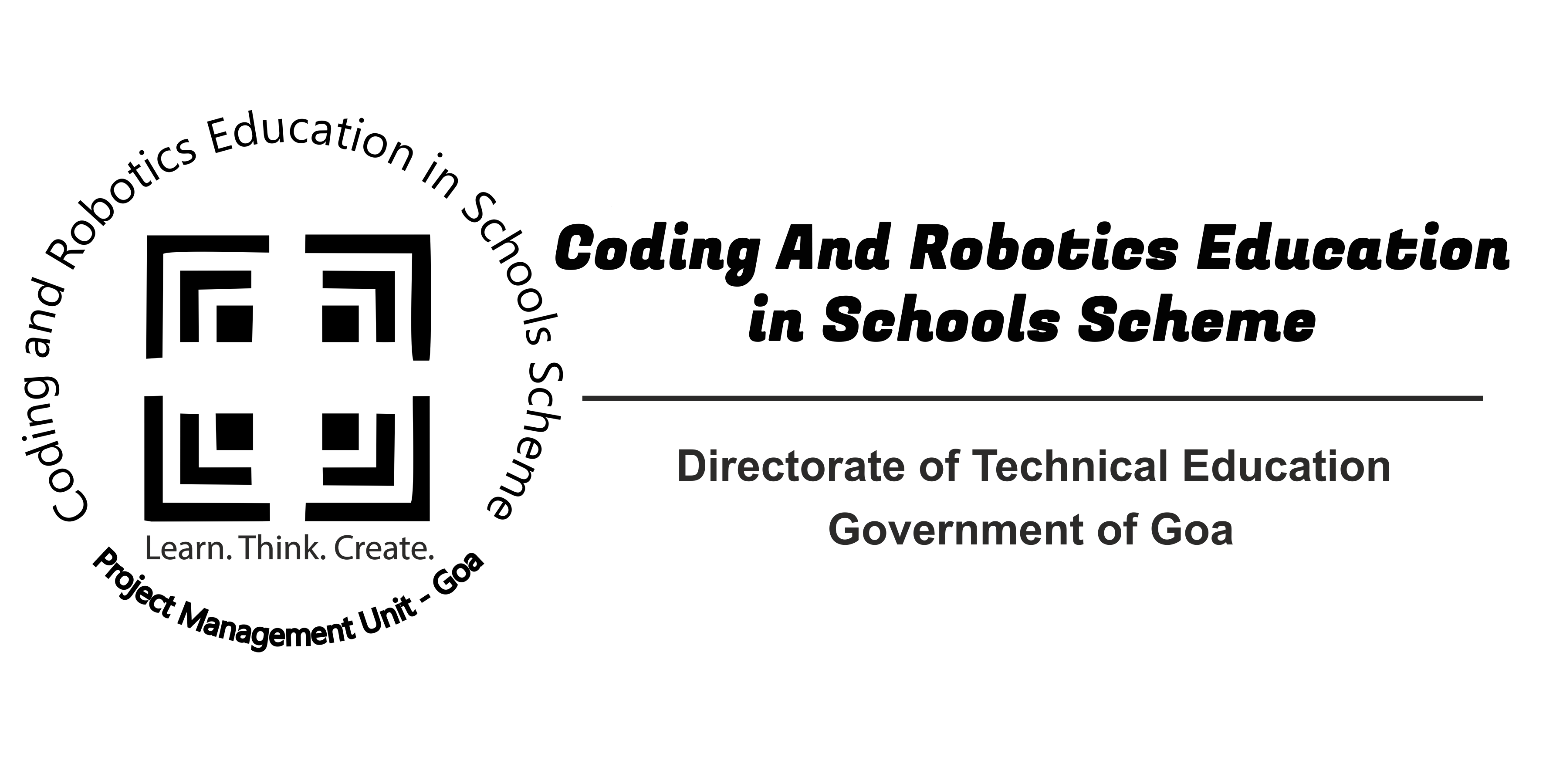FAQ
on Coding and Robotics Education in Schools of Goa Scheme
Content HereThe scheme envisions to develop computational and design thinking skills along with programming integrated into the school level education for the state of Goa to prepare students for the demands of the 21st century digital world.
The scheme will strive to achieve
- Making coding skills ubiquitous across the school-level student population in Goa.
- Setting up coding / development labs, design studios, and towards having a penchant towards entrepreneurship.
- To provide financial/ Traineeship support for developing project ideas, part-take in hackathons, conferences, and symposiums.
- To infuse requirement meeting problem-solving and technical skills into the Goan education system through technical manpower, curriculum focusing on Design/Computational Thinking and Programming.
- Develop a workforce for the on-coming way of life based on digital technology.
- Provide a level playing field to students from rural areas to acquire skills which have been accessible mainly to urban students.
- Application of theoretical concepts of Maths and Science taught in school to solve real world problems through Coding and Robotics
- Learn by exploration
- Skill that will help us to accept upcoming technologies easily
- Build concepts and theory from experience and validate through experiments
- Just like in real world
- Don’t get loaded with terminologies
- Yet, learn to get required information easily
- Accept multiple answers
- As long as it’s the solution to our problem
- Express more through storytelling, music and arts
- And also do it through programming, software tools and online collaboration
- Understand science and applications of mathematical concepts
- By building games and simulations
- Use technology to help and grow
- Yet, save ourselves from threats
In order to meet the above mentioned objectives, the scheme initiatives are classified into the following three key areas, for which the scheme will provide support in terms of:
- Infrastructure Development
- Technical Manpower
- Facilitation and promotion
- Development of logical reasoning skills
- Problem solving skills
- Development of team spirit
- Development of skills in Coding, Robotics and App building
- Development of the ability to explore and learn with limited assistance.
- Development of skills in Tinkering.
- More successful career in the digital world
- Build awareness of business terminology
- Help students turn creators
- Improvement in likeability and marks in related subjects of Maths and Science
- Syllabus has been revamped for Class VI, VII, VIII
- Teachers handbook has been prepared for Class VI regular and Class VI optional
- Teachers training for 510 teachers for implementing the class VI syllabus
- An elaborate hierarchical model of Teacher capacity building is being implemented which consists of Core Master Trainer (State Level) – Master Trainer (Taluka Level) – Coordinator Teacher (Cluster Level) – Teacher (School Level)
| Coding and Problem solving through composition | Regular Syllabus | Optional Syllabus | |||
| Domain | Tools | Domain | Tools | ||
| Building simple games | |||||
| VI | Shapes | Scratch/ Pictoblox | Pose detection | Scratch/ Pictoblox | |
| Colloboration | Google docs/ only office | Image Detection | Scratch/ Pictoblox | ||
| Graphics | GIMP | Handwriting detection | Scratch/ Pictoblox | ||
| Internet | Face Detection | Scratch/ Pictoblox | |||
| Data safety | Voice Detection | Scratch/ Pictoblox | |||
| Creating Interactive 2D and 3D content | |||||
| VII | Creating art | Kojo | Sensors/ controllers | Kojo | |
| Data processing | SpreadSheets | Robot | Arduino | ||
| 3d Image editing | Blender | Robot Movement | Robot | ||
| HTML | Component Interface | ||||
| Internet | |||||
| Creating Audio Visual Content | |||||
| VIII | Creating Music | Sonic Pi | App building | MIT app Inventor | |
| Video Graphics | Blender | Integration with Robotics | Kojo | ||
| CSS | Text Editors | ||||
| Internet | |||||
- Academic Year 2021-22:
- ○ Std 6 syllabus implemented for std 6, 7 and 8
- Academic Year 2022-23:
- ○ Std 6 syllabus delivered for std 6
- ○ Std 7 syllabus implemented std 7 and 8
- Academic Year 2023-24:
- ○ Std 6 syllabus delivered for std 6
- ○ Std 7 syllabus delivered for std 7
- ○ Std 8 syllabus implemented std 8
Coding Competitions for students
https://cares.goa.gov.in/competitions/
https://drive.google.com/file/d/1q13rJlzRxtnrm-lpVhCNTRiMx-Qks5WE/view?usp=sharing
Regular Recognition of special creations by students
https://docs.google.com/document/d/1-MPoVFTiuIeUEr2BrK98jIQPYnyZ567PAicgDxNixdQ/edit?usp=sharing
State Prize Winners Video
Logo Competition
https://goa.mygov.in/task/logo-design-competition-coding-and-robotics-education-schools-scheme-–-2021

